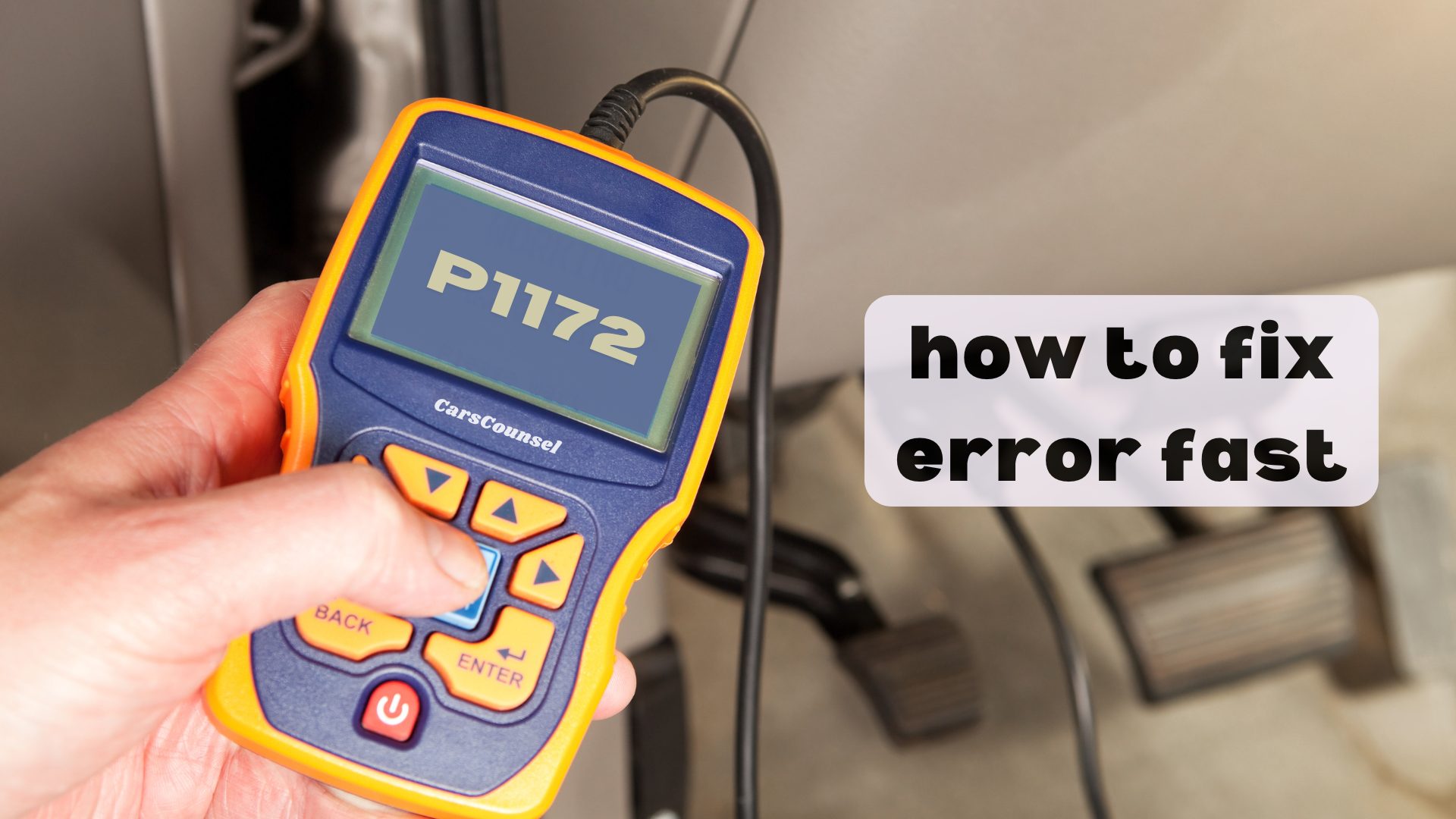You’ve got a P1172 code flashing on your dashboard, and you’re wondering what’s going on. Fundamentally, this code indicates that the rear air/fuel sensor bank 1 sensor 1 circuit is sending a voltage signal that’s way out of whack.
This can lead to some pretty annoying symptoms like rough idling, stalling, and poor fuel efficiency. But what’s causing this faulty sensor? Is it a wiring issue, a problem with the ECU, or something else entirely? You’ll need to dig deeper to find the root cause and get your engine running smoothly again.

Quick Navigation
Key Takeaways
- The P1172 code indicates a problem with the Rear Air/Fuel (A/F) Sensor Bank 1 Sensor 1 circuit, which is causing high-voltage readings to be out of range.
- A faulty Rear A/F Sensor or issues with wiring, connectors, ECU, exhaust system, or fuel system can trigger this code.
- Symptoms include decreased fuel efficiency, rough idling, stalling, Check Engine Light, poor acceleration, and increased emissions.
- To diagnose, use a scan tool to verify the code, inspect wiring and connectors, and test the sensor’s voltage output against manufacturer’s specifications.
- Replacing faulty sensor components and ensuring proper maintenance can resolve the issue and improve fuel efficiency.
Code P1172 Description
When your vehicle’s onboard computer detects a problem with the Rear Air/Fuel (A/F) Sensor Bank 1 Sensor 1 circuit, it triggers the P1172 code.
This fault code indicates that the sensor is registering high voltage outside the expected range. This can lead to inaccuracies in fuel delivery, affecting your vehicle’s performance and emissions.
The Rear A/F Sensor monitors the air-fuel mixture in the exhaust system, providing feedback to the engine control unit (ECU) to maximize combustion efficiency.
Sensor voltage fluctuations can disrupt the air-fuel ratio, causing problems.
The ECU relies on accurate sensor data to adjust the air-fuel mixture for peak engine performance.
What Causes P1172 Code
Fluctuations in the Rear A/F Sensor’s voltage output can have far-reaching consequences, and understanding the root causes of the P1172 code is essential to addressing the issue effectively.
You might be dealing with a faulty Rear A/F Sensor Bank 1 Sensor 1, which can cause sensor failure. Wiring or connector issues, ECU malfunction, exhaust system leaks, or fuel system problems can also trigger this code.
These issues can lead to inaccuracies in fuel delivery, resulting in fuel inefficiency. Identifying the root cause of the P1172 code is pivotal to resolving the problem and preventing further damage to your vehicle’s engine and exhaust system.
Symptoms of P1172 Error
One of the most telling signs you’ve got a P1172 code issue is decreased fuel efficiency, which can be a real pain in the wallet. When your engine’s air-fuel mixture is off, you’ll notice your gas mileage taking a hit. But that’s not all – a P1172 error can also affect your engine’s performance, leading to rough idling, stalling, or a lack of power when accelerating.
| Symptom | Description | Impact on Vehicle |
|---|---|---|
| Decreased Fuel Efficiency | Engine burns more fuel than usual | Increased fuel costs |
| Rough Idling or Stalling | Engine struggles to maintain a smooth idle | Decreased engine performance |
| Check Engine Light | Illuminates on your dashboard | Indicates a problem with your engine |
| Poor Acceleration | Engine lacks power when accelerating | Decreased driving performance |
| Increased Emissions | Engine releases more pollutants into the air | Negative environmental impact
Diagnosing P1172 Code Issues
Now that you’ve identified the symptoms of a P1172 code issue, it’s time to get to the bottom of the problem.
Your first step is to use a scan tool to verify the P1172 code and pinpoint the source of the problem. This will help you determine if the issue lies with the Rear A/F Sensor Bank 1 Sensor 1, wiring, or another component.
Scan tool tips include checking for any other trouble codes that may be related to the P1172 code.
Next, inspect the wiring and connectors associated with the sensor for damage or corrosion.
Proper sensor maintenance is vital to guarantee accurate readings.
Fixing Rear A/F Sensor Problems
You’ve diagnosed the P1172 code issue and pinpointed the problem to the Rear A/F Sensor Bank 1 Sensor 1.
Now it’s time to fix the problem. To start, verify proper sensor maintenance by inspecting the wiring and connectors associated with the Rear A/F Sensor for damage or corrosion.
Clean or replace them if necessary. Next, test the sensor’s voltage output and compare it to the manufacturer’s specifications.
If the output is still out of range, it may be a sign of a faulty sensor. Guarantee properly maintaining the Rear A/F Sensor will help improve fuel efficiency and prevent future issues.
Replacing Faulty Sensor Components
Faulty sensor components can significantly impact your vehicle’s performance, and replacing them is crucial to restoring peak engine function.
To guarantee prime sensor maintenance, it’s essential to identify and replace faulty components promptly. Fault tolerance is critical in modern engines, as even minor issues can lead to significant performance drops.
When replacing faulty sensor components, make sure to follow the manufacturer’s guidelines and specifications. This includes selecting the correct replacement parts and certifying proper installation.
Additionally, inspect the surrounding wiring and connectors for damage or corrosion, as these can also affect sensor performance.
P1172 Code Repair Costs
Reliability is key in the context of estimating P1172 code repair costs, as inaccurate quotes can lead to unnecessary expenses.
When seeking repair estimates, it’s essential to consult a qualified mechanic or auto repair shop for an accurate cost analysis.
The typical repair cost for replacing the Rear A/F Sensor Bank 1 Sensor 1 ranges from $150 to $300 for the part, plus labor.
This brings the total repair cost, including parts and labor, to around $250 to $500.
Keep in mind that these estimates may vary depending on your vehicle’s make and model.
Be sure to get a detailed quote from your chosen mechanic or repair shop to guarantee you’re prepared for the costs involved in resolving the P1172 code issue, and to confirm that you have a clear understanding of the expenses.
Additional Troubleshooting Tips
When diagnosing the P1172 code, it’s essential to ponder a few additional troubleshooting tips to verify accurate diagnosis and efficient repair. You should guarantee that the Rear A/F Sensor Bank 1 Sensor 1 is properly maintained, as faulty sensors can lead to inaccurate fuel delivery and decreased fuel efficiency. Additionally, inspect the wiring and connectors for damage or corrosion, as this can also cause issues.
| Troubleshooting Tips | Description |
|---|---|
| Check sensor maintenance | Certify proper cleaning and replacement of sensors to maintain accuracy |
| Inspect wiring and connectors | Look for damage, corrosion, or loose connections |
| Verify exhaust system integrity | Check for leaks or blockages that can affect sensor readings |
| Review fuel system operation | Confirm proper fuel pressure and flow to avoid sensor inaccuracies |
| Use scan tools for diagnosis | Utilize scan tools to pinpoint the source of the problem and verify repairs |
Understanding Rear A/F Sensors
Now that you’ve checked the wiring and connectors, it’s time to take a closer look at the Rear A/F Sensor itself.
This sensor utilizes advanced sensor technology to monitor the air-fuel mixture in your exhaust system, providing vital feedback to your engine control unit (ECU) to optimize combustion efficiency.
- Exhaust monitoring: The Rear A/F Sensor is responsible for tracking the air-fuel mixture in your exhaust system, which allows the ECU to adjust fuel delivery accordingly.
- Voltage output: The sensor produces a voltage signal that corresponds to the air-fuel mixture, which is then sent to the ECU for analysis.
- High-temperature operation: The Rear A/F Sensor is designed to operate in high-temperature environments, making it a vital component in your vehicle’s emissions control system.
Preventing Future P1172 Errors
One key aspect of preventing future P1172 errors is to guarantee your vehicle’s exhaust system is properly maintained.
A well-maintained exhaust system verifies your Rear A/F Sensor Bank 1 Sensor 1 operates within its ideal range, reducing the likelihood of high voltage readings.
Regular Sensor Maintenance is vital, as a faulty sensor can lead to decreased Fuel Efficiency and P1172 errors.
Make sure to inspect your sensor and its wiring regularly, and replace it if necessary.
Additionally, addressing Exhaust System Leaks and Fuel System Problems can also prevent P1172 errors.
More OBD-II Codes
Frequently Asked Questions
Can I Drive My Vehicle With the P1172 Code Illuminated?
You can still drive your vehicle with the P1172 code, but be cautious: decreased fuel efficiency, rough idling, and poor acceleration may affect safe operation; it’s essential to address the issue promptly to avoid further damage and potential driving restrictions.
Will a Faulty Rear A/F Sensor Affect My Vehicle’s Warranty?
You should check your vehicle’s warranty terms to see if a faulty rear A/F sensor affects warranty coverage; typically, warranty eligibility isn’t voided by sensor failures, but neglecting repairs might impact future warranty claims.
How Often Should I Replace My Rear A/F Sensor for Maintenance?
You should replace your rear A/F sensor as part of your vehicle’s maintenance schedule, typically every 50,000 to 70,000 miles, depending on the manufacturer’s recommendations, to guarantee maximum sensor lifespan and prevent premature failure.
Can I Clean the Rear A/F Sensor Instead of Replacing It?
Can you really restore your rear A/F sensor to its former glory? Unfortunately, cleaning it’s unlikely to improve sensor performance, as contaminants often damage the sensitive components, and replacing it’s the best bet to regain ideal fuel efficiency.
Will a P1172 Code Cause My Vehicle to Fail an Emissions Test?
You’re likely to fail an emissions test with a P1172 code, as it indicates inaccurate fuel delivery and increased emissions. Test readiness monitors will flag your vehicle, and it won’t meet emissions standards, so addressing the issue is vital.
Conclusion
You’ve finally cracked the code, literally! Remember, an ounce of prevention is worth a pound of cure. Don’t let a faulty Rear A/F Sensor Bank 1 Sensor 1 circuit hold you back from peak engine performance. Stay on top of your vehicle’s maintenance, and you’ll avoid the hassle and expense of dealing with P1172 code issues. By being proactive, you’ll save time, money, and frustration in the long run.

